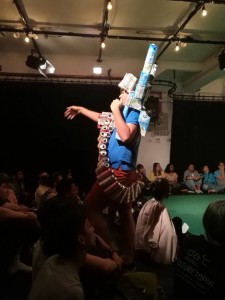What has changed for Malaysians after the country’s development plan, Wawasan 2020, came about? Two years from reaching that date, five performers find themselves lumped with a new vision called Transformation Nasional 2050. I guess the ones who were chosen to be part of the TN50 discussions didn’t include this particular lot!
But it’s an intriguing thought. It could open the door to a maelstrom of angst, on paper.
But to discuss as a piece of performance art, the impact of two visions running from 1991 to the present-day, as per Five Arts Centre’s Version 2020 – The Complete Futures Of Malaysia (Chapter 3), proved thought-provoking and quite interesting.
Version 2020 was commissioned by the Spielart Festival Munich in Germany where it premiered last October before touring in Tokyo’s Theatre Commons in February.
The performers were artist Fahmi Reza, dancer-choreographer Lee Ren Xin, actor Faiq Syazwan Kuhiri, and filmmakers Imri Nasution and Roger Liew. Under the direction of Mark Teh, they each shared their own realities of the these visions dreamed up by the government leadership of the day.
Using “thought words” on pieces of paper, like Protest is Patriotic, Bersih!, I Love C**k, Hope, each performer had their day in the limelight.
The discourse ran from school artworks of what Wawasan 2020 looked like to the kids, to what actually transpired in their personal lives.
I could relate to the songs and performances we had to put on to celebrate Wawasan 2020. I did this too for the newly independent country too, waaay back when.
Fahmi’s “story” proved fascinating. The activist and graphic designer was recently in the spotlight for posting a caricature of a national leader on social media.
Some may recall his documentary for the 2007 Freedom Film Fest, called Sepuluh Tahun Sebelum Merdeka (Ten Years Before Independence).
He spoke of receiving a scholarship to study in the US. It was for electrical engineering, and came with a bond of 10 years to the institution. Fahmi came home in 2002, and was drawn to helping civil society issues. From police brutality to Dataran Merdeka, a public park that was put off-limits the same public, and a student protest for higher education reforms called Occupy Dataran.
There was nothing nostalgic in this Version 2020 performance. But it was obvious that the visions of leaders do not reflect in the ordinary lives of these performers, which may be a reflection of the lives of most Malaysians.You know, the Everyman concept.
It was interesting to see the younger three performers – Lee, Liew and Faiz – offer their versions in tandem. Lee was physically strenuous, as she moved on the floor, legs wheeling… for “I can do this as even a 93-year-old is still running”. I am paraphrasing as I caught the show on March 30, 2018.
Here’s one line I do remember: “A city that speaks to me a language that I no longer understand.” Hmmm, or a country?
I think the part that made me catch my breath was when the actors started tunnelling beneath the green carpet in the Black Box, till a tent akin to those used in Occupy Dataran arose.
From within was Faiz, speaking about his vision and disconnect, as a torchlight shone shadows. In the end, the five performers each vocalised their personal dream.
But, there was no new vision presented like a neat package. Version 2020 was perhaps to make us think of making our own visions, and to make them stick.
For the pre-story, and Mark Teh’s ideas, visit https://www.nst.com.my/lifestyle/groove/2018/03/343409/designing-future


